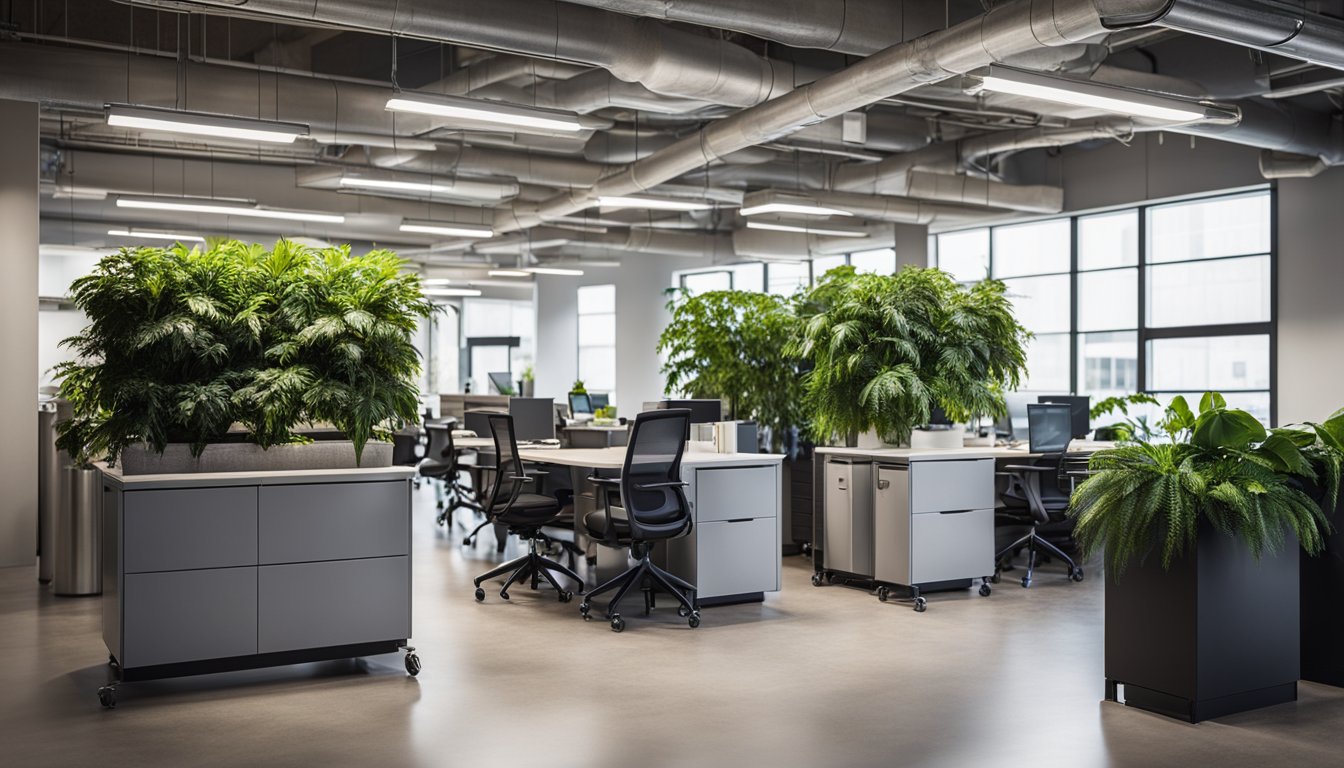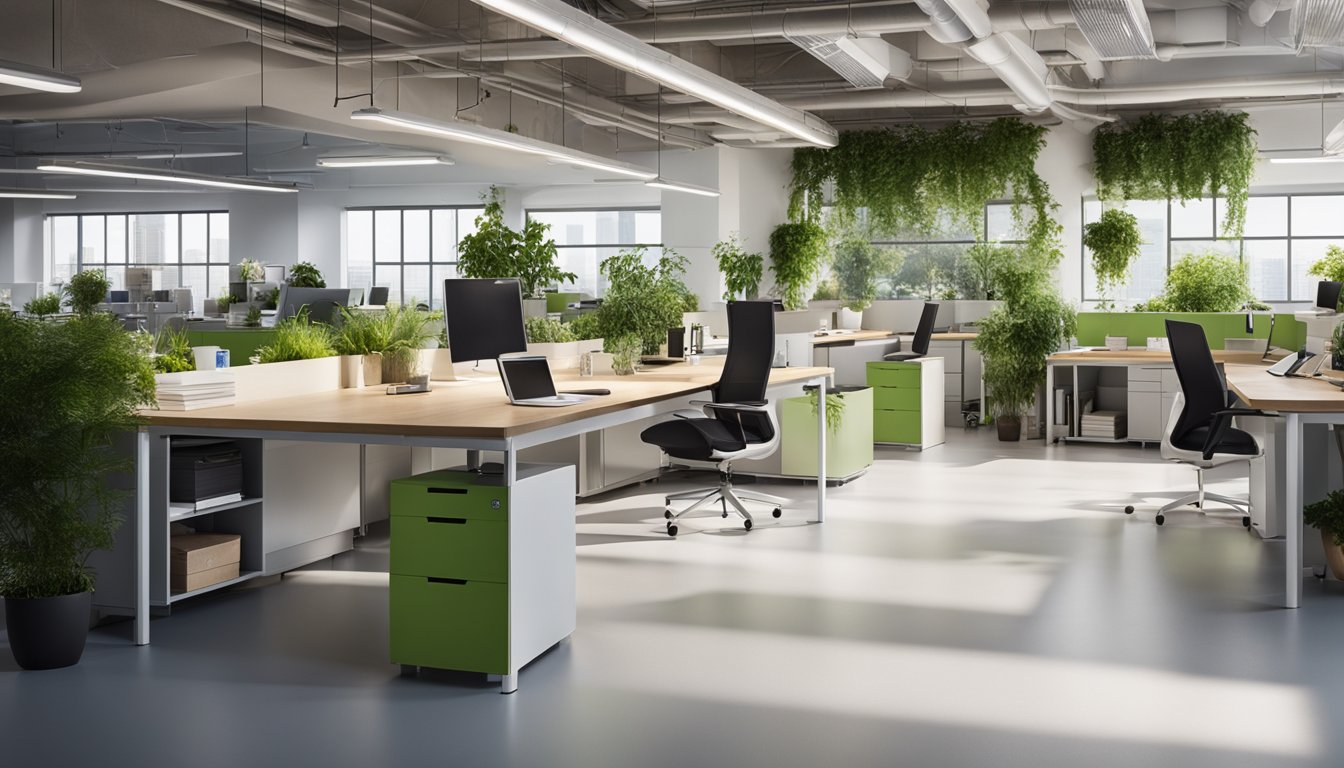Late updated: 01 Dec 2024 14:12
Written by: Amber Collins
Eco-Friendly Upgrade Ideas For UK Office Spaces: Transform Your Workplace Sustainability
Making the move towards eco-friendly office spaces in the UK is no longer just an ideal but a necessity as organisations become more aware of their environmental impact. We can tackle this transformation by implementing energy-efficient practices and adopting sustainable materials. Simple changes like upgrading to energy-efficient office equipment or choosing sustainable construction materials can remarkably reduce an office's carbon footprint. These efforts not only benefit the planet but also create a healthier working environment that can boost employee productivity and morale.

We must reflect on how our office culture impacts sustainability. Encouraging eco-conscious behaviour among employees is key to ensuring that the changes we implement have a long-lasting effect. By promoting practices such as recycling and mindful energy use, we can foster a sense of responsibility and community that aligns with our sustainability goals.
Ultimately, creating an eco-friendly workspace requires both strategic planning and a collective commitment. By setting clear sustainability objectives, we can transform our offices into spaces that not only adhere to environmental standards but also inspire innovation and progress.
Key Takeaways
- Implement energy-efficient practices and materials.
- Foster eco-conscious behaviour within the office.
- Set clear sustainability goals for long-term impact.
Optimising Office Space for Sustainability

To create a sustainable office environment, focusing on energy efficiency, integrating natural elements, and improving indoor air quality are critical steps. Sustainable practices contribute to a reduced carbon footprint and a more eco-friendly workspace.
Adopting Energy-Efficient Lighting and Appliances
Switching to LED light bulbs is a straightforward and effective way to reduce energy consumption. LEDs use significantly less energy than traditional lighting and have a longer lifespan. By replacing old appliances with energy-efficient models, we can further decrease electricity usage. Energy-efficient appliances are designed to consume less power while maintaining performance, providing lower utility bills and less environmental impact.
We can install motion sensors in less frequently used areas to prevent unnecessary lighting. Utilising smart power strips can also contribute to energy-saving efforts by turning off idle devices.
Implementing Green Energy Solutions
Incorporating renewable energy sources like solar or wind power into our office setup can substantially cut down our carbon footprint. Solar panels, while requiring initial investment, can lead to long-term savings on electricity costs.
Wind turbines, though less common, may be suitable for certain locations and serve as an alternative to traditional power. By subscribing to green energy tariffs, we can support sustainable energy initiatives and ensure our electricity consumption aligns with eco-friendly practices.
Enhancing Air Quality and Ventilation
Proper ventilation plays a vital role in maintaining high-quality indoor air, which is essential for the health and well-being of employees. Improved air quality reduces the risk of health issues and increases overall productivity. Implementing advanced air filtration systems designed to remove pollutants can be a valuable investment.
Regular maintenance of HVAC systems ensures optimal performance and energy efficiency. Additionally, utilising energy recovery ventilation systems can help recycle and reclaim energy from exhaust air, thereby improving efficiency.
Integrating Natural Elements through Biophilic Design
Biophilic design connects office spaces with nature, promoting well-being and creativity. This can be achieved by incorporating natural light, plants, and water features into the workspace.
Natural light not only reduces energy consumption from artificial lighting but also positively impacts mood. Introducing indoor plants improves air quality by absorbing pollutants and releasing oxygen. Features such as green walls and water installations enhance the aesthetic and environmental quality of the space. Embracing biophilic elements cultivates a more sustainable and inviting office environment.
Fostering an Eco-Conscious Office Culture
Creating an eco-conscious office requires us to focus on various sustainable practices that benefit both the environment and workplace efficiency. By embracing digital documentation, recycling, and green commuting methods, we lay the groundwork for a truly sustainable office environment.
Transitioning to a Paperless Office
Transitioning to a paperless office is a crucial step for reducing waste. We can start by digitising records and implementing cloud-based systems. This move reduces paper consumption and limits physical storage needs.
Utilising digital signatures and e-filing systems streamlines workflow, enhancing productivity. Encouraging meetings and collaborations through video conferencing and project management tools can also reduce paper use. The accessibility of digital documentation makes it easier for employees to share and manage information efficiently.
By adopting these technologies, we not only cut down on unnecessary paper waste but also promote greater operational efficiency. This shift reflects our commitment to creating a sustainable workspace.
Promoting Recycling and Waste Reduction Initiatives
Implementing a robust recycling program is vital to managing office waste. Recycling bins should be clearly marked for different materials, such as paper, plastics, and glass, and placed in high-traffic areas. It’s important for us to provide employee training on maintaining these practices.
Introducing eco-friendly office supplies, like recycled paper and refillable pens, further enhances our waste reduction efforts. A green team can be established to monitor these practices and suggest improvements. By incorporating these initiatives, the office can significantly reduce its environmental footprint and promote a culture of sustainability.
These proactive measures encourage everyone to be mindful of their impact, fostering a collective commitment to reducing waste.
Encouraging Eco-Friendly Commuting
Promoting green transportation options can drastically lower carbon emissions related to commuting. We can support initiatives such as carpooling schemes, incentives for cycling to work, and utilising public transportation. These options provide alternatives to driving alone and help mitigate traffic congestion.
Providing secure bicycle storage and shower facilities can encourage more employees to choose this healthy and eco-friendly commuting method. Remote work opportunities also reduce the need for daily commutes, further lowering our carbon footprint.
By fostering these practices, we not only benefit the environment but also often improve employee satisfaction by offering more diverse commuting methods.
Engaging Employees in Sustainability Initiatives
Employee engagement is key to the success of sustainability initiatives. Establishing sustainability workshops and forming a green team allow us to encourage active participation. Through these activities, employees can share suggestions and develop action plans tailored to our office culture.
Regular meetings to track progress and reward achievements can motivate everyone to contribute. Initiating coworking spaces or activities to brainstorm eco-friendly ideas will keep employees invested in sustainability goals.
Employee-led initiatives are particularly effective, as they foster a sense of ownership. This involvement ensures our sustainability practices are innovative and resonate with our team’s values.
Frequently Asked Questions

In this section, we address common concerns regarding sustainable office practices in the UK. From energy-saving methods to eco-friendly furniture, we explore practical solutions that contribute to greener office environments.
What are the top ways to make UK office spaces environmentally friendly?
Adopting energy-saving technologies, using eco-friendly materials, and implementing green building standards are effective strategies. These methods reduce energy consumption and improve the environmental footprint of office spaces.
How can businesses incorporate green furniture in their office design?
To integrate green furniture, consider using items made from recycled materials or responsibly sourced wood. Modular systems and furniture designed to last also align with sustainable principles and contribute to an eco-friendly design.
What are some innovative sustainability projects appropriate for office settings?
Projects such as installing green roofs and creating biophilic interiors can enhance sustainability. These initiatives help manage stormwater, reduce energy consumption, and improve indoor air quality, contributing to a healthier workplace.
What measures can be taken to reduce the carbon footprint of an office in the UK?
Optimising energy usage through smart technology, reducing waste, and encouraging public transport or cycling to work are effective measures. Implementing a robust recycling programme and using renewable energy sources can further diminish carbon emissions.
In what ways can office spaces contribute to sustainability outside of recycling?
Office spaces can promote sustainability by improving energy efficiency, enhancing indoor environmental quality, and fostering sustainable travel options. Using natural lighting, optimising heating and cooling systems, and providing bike racks contribute to a more sustainable workplace.
How can a home office setup be optimised for eco-friendliness?
For a greener home office, favour energy-efficient appliances and LED lighting. Utilise furniture made from sustainable materials, and ensure electronics are turned off when not in use. Implementing a small-scale composting system for office waste can also enhance eco-friendliness at home.
